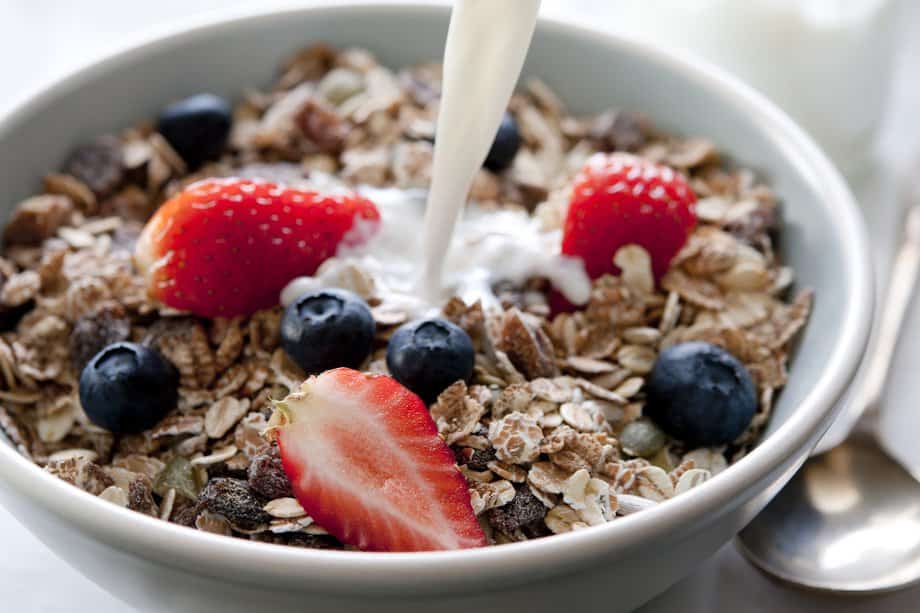Eating and exercise go hand in hand. When and what you eat can be important to how you feel when you exercise, whether it’s a casual workout or training for a competition. Consider these eating and exercise tips. Keep reading on to know what to eat before a workout.
Contents
What to Eat Before a Workout
Carbs
Your muscles use the glucose from carbs for fuel.
Glycogen is the way the body processes and stores glucose, mainly in the liver and muscles.
For short- and high-intensity exercise, your glycogen stores are your muscles’ main source of energy.
But for longer exercises, the degree to which carbs are used depends on several factors. These include the intensity, type of training and your overall diet.
Your muscles’ glycogen stores are limited. As these stores become depleted, your output and intensity diminish.
Studies have consistently shown that carbs can increase glycogen stores and utilization while boosting carb oxidation during exercise.
Carb loading, which involves consuming a high-carb diet for 1–7 days, is a well-known method to maximize glycogen stores.
Protein
Many studies have documented the potential of pre-workout protein consumption to improve athletic performance.
Eating protein (alone or with carbs) prior to exercise has been shown to increase muscle protein synthesis.
One study showed a positive anabolic response after participants consumed 20 grams of whey protein before exercise.
Other benefits of eating protein before exercise include:
- A better anabolic response, or muscle growth.
- Improved muscle recovery.
- Increased strength and lean body mass.
- Increased muscle performance.
Oatmeal With Low-Fat Milk and Fruit

Do you work out in the morning? Start your day with a bowl of high-fiber oatmeal and fruit. Your body digests the carbs in this combo more slowly, so your blood sugar stays steadier. You’ll feel energized for longer. For an extra dose of protein and bone-building calcium, stir in some low-fat milk.
Fruit-and-Yogurt Smoothie
Smoothies are easy to digest, so you won’t feel sluggish during your workout. But many store-bought versions are high in added sugar. Whip up your own version with protein-rich yogurt and fruit, which packs in energy-boosting carbs. Blend it with water or ice to help you stay hydrated. Research shows that not getting enough fluids can zap your strength and endurance.
Whole orange smoothie
Swap out sugar-packed juice for the real deal in this whole-orange smoothie. Confused about what kind of protein powder to use? Seebohar likes Thorne Research or NOW Foods protein powders.
Hard-boiled egg and avo toast
Avocado toast never fails. When you have a heartier appetite, try this pre-workout version and add a hard-boiled (or fried) egg on top for added protein. There are a lot of ways to get fancy here, but we’re big fans of this classic combo before a morning run.
Low-fat cottage cheese and dried apricots
Cottage cheese is a power-packed breakfast (or snack) that contains healthy amounts of casein and whey protein. Casein is a slow-digesting protein that fuels your muscles for hours, helping them grow and recover; whey is a bodybuilding essential that helps bulk muscle and burn fat. Add dried apricots to a serving of cottage cheese: The combo of protein and carbs is low in fat and fiber, which can sometimes cause belly bloat.
Drink plenty of water
It’s best to get your body hydrated before you even think about heading to the gym. One way to determine your overall hydration status is to check out the color of your urine first thing in the morning. According to the Academy of Nutrition and Dietetics, lemonade-colored urine is a sign of appropriate hydration, while dark-colored urine (think apple juice) indicates a deficit in H20.
While there’s no one-size-fits-all method to determining fluid needs during exercise, a good place to start is drinking about two cups of water around two to three hours before exercise and one cup of water about 10 to 20 minutes before working out. The goal here is to minimize dehydration—which can cause low energy and muscle cramps or spasms—without drinking too much water, which isn’t easy to do but can be dangerous.
You should also try to stay hydrated throughout your workout. Consider drinking one cup of water for every 15 to 30 minutes of intense physical activity, especially if you are sweating profusely or are training in a heated environment. Again this may take a bit of experimentation until you find what works best for your body.



